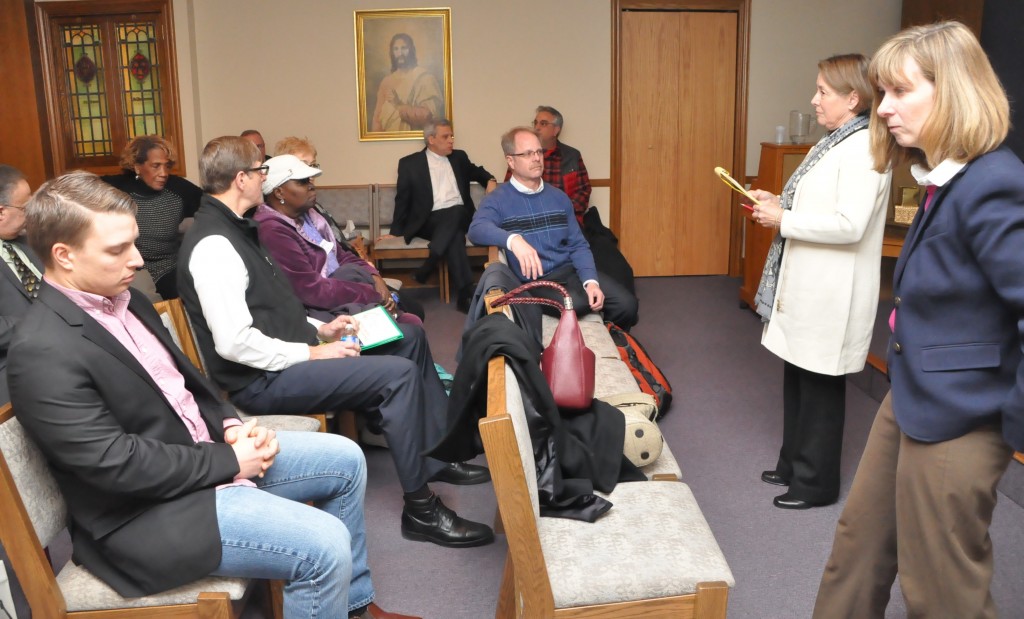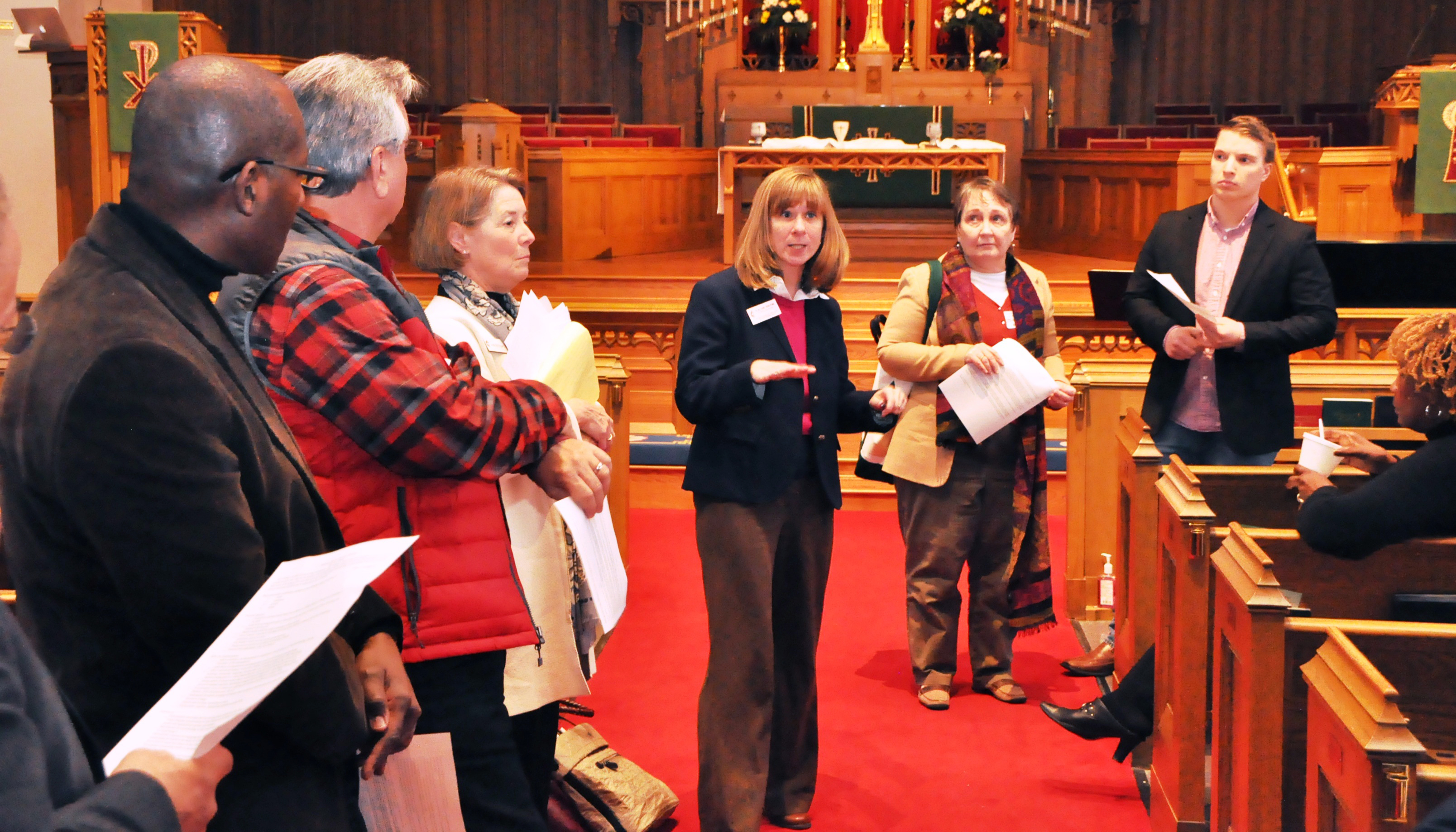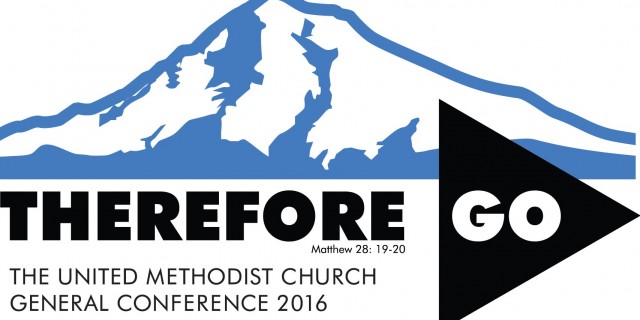April will be a defining month for Eastern PA Conference delegates to The United Methodist Church’s 2016 General Conference and Northeastern Jurisdictional Conference, as they carefully consider both legislation and leadership for the denomination’s future.
The delegates will interview four locally nominated candidates for the episcopacy April 2 in hopes of recommending one or more for endorsement by the Annual Conference in June. Six persons received the minimum required 10 nominations from conference members, but two declined nomination.
The delegates will also hold four Listening and Discernment Sessions*, scheduled for April 11, 16, 20 and 23, to hear views and concerns put forth by conference members for their consideration. Three of the sessions will take place at Northeast, Central and Northwest district churches.* The fourth, on April 23, during the delegation’s seventh and final meeting before General Conference, will be a call-in session allowing members to participate by conference call.
In monthly meetings since December, the group has examined policies and procedures, key legislative concerns, committee assignments and many other aspects of their work together, as they prepare for what will surely be history-making global and regional gatherings.
Delegation co-leaders the Rev. Dawn Taylor-Storm and Judy Ehninger attended the Pre-General Conference Briefing Jan. 20-22, along with about 400 other delegation heads, church journalists and United Methodist agency and conference leaders. At the sprawling Oregon Convention Center in Portland, where the 2016 General Conference will take place May 10-20, they learned about new procedures and practical advice for surviving the quadrennial marathon meeting. But they also learned about significant issues and perspectives the worldwide assembly will address in dialogue and debate over the nearly 1,000 petitions submitted.
Christian conferencing on tough issues
Many expect the most passionate and difficult debate to deal with how the denomination ministers with gay, lesbian, bisexual and transgender people. At the briefing, participants got a preview of a proposed alternative process for discussing legislation on tough issues.
“Rule 44 (so named because it would follow General Conference Rule 43 if adopted) seeks to embody Wesley’s understanding of Christian conferencing,” reported Taylor-Storm. “In small groups, without the use of Robert’s Rules of Order, delegates would discuss proposed resolutions and try to find areas of consensus. Trained facilitators and moderators would make sure all voices are heard at the table. If Rule 44 is accepted it will be used to discuss 99 of the resolutions relating to human sexuality.”
The briefing also previewed proposals aimed at embracing the increasingly global nature of the denomination and its General Conference by lessening the central focus on the U.S. church. A frequent complaint about General Conference is that delegates spend much of the 10-day global meeting on issues that strictly focus on the U.S.
A new General Book of Discipline would contain essential policies and procedures that apply to the entire worldwide church. But supplemental volumes would contain rules that apply respectively to the diverse cultural and legal contexts of various regions.

Church restructuring proposals
And several church restructure proposals, including one offered by the NEJ Global Structure Task Force, would put the U.S., or North America, on equal organizational footing with other global regions of the church. U.S. conferences would meet and address their legislative and societal concerns separately as one body; and the global General Conference would meet to address primarily international church and societal matters.
These and other restructuring proposals would take at least four years—until the 2020 General Conference—to be refined with annual conference feedback and then implemented in compliance with the denomination’s constitution.
The Connectional Table (CT) will propose a process for restructuring itself by 2020 into a General Church Council that “exemplifies the diversity of our connection,” Taylor-Storm shared from presentations she heard. The CT believes any restructuring of the church should be delayed until 2020 to allow time to develop a structure that “helps our denomination achieve its mission in an increasingly interconnected, intergenerational, worldwide context.”
In addition, several groups, including the Ministry Study Commission and the Association of Annual Conference Lay Leaders, are proposing key changes to orders of ministry and the tenure of bishops. Their petitions are part of an overall concern for ensuring that the church can “broaden pathways to ordained ministry” and foster long-term effectiveness in clergy leadership.
Following the Portland event, Eastern PA’s delegates joined others from the Peninsula-Delaware, Baltimore-Washington, Greater New Jersey and Susquehanna conferences Jan. 30 at First UMC Lancaster for a similar briefing on legislative issues. They heard presentations and asked questions of representatives from the Connectional Table, the general boards of Church and Society, Archives and History, and Pensions and Health Benefits, and the Publishing House.
When they meet April 2 our delegates will interview vetted nominees to endorse for election as bishop at the Northeast Jurisdictional (NEJ) Conference in July. Currently, there will be expected openings in two episcopal areas. However, the number of elections will be determined when the Inter-Jurisdictional Committee on the Episcopacy decides in May if the NEJ must lose a bishop and thus combine several episcopal areas due to its overall membership decline.
If this happens it is generally expected that the Peninsula-Delaware Conference, now aligned with Eastern PA as part of the Philadelphia Episcopal Area, would be realigned with the Baltimore-Washington Conference. Then Eastern PA would need to be realigned with another adjoining conference, most likely Greater New Jersey.
More key proposals coming to General Conference
Changes for Clergy and Bishops
Bishops would no longer be elected for life, ordination of United Methodist elders and deacons would be faster and the first step would be taken toward terminating guaranteed appointment for clergy.
The Ministry Study Commission report recommends ministry candidates be ordained upon completing educational requirements and being approved for provisional conference membership, rather than two years later when they are approved for full conference membership. Failure to achieve full membership would nullify their ordination.
Also a bachelor’s degree with religion courses could fulfill Course of Study requirements for local pastors, who would no longer have to be age 40 or older to pursue local pastor licensing. And new rules would strengthen lifelong learning requirements and require mentoring or coaching and periodic assessments for all clergy.
The Association of Annual Conference Lay Leaders’ clergy leadership proposals could lead eventually to the end of guaranteed appointment for full elders by giving General Conference delegates the right to override a Judicial Council ruling of unconstitutionality. The council nullified the 2012 General Conference decision to eliminate guaranteed appointments by declaring it unconstitutional.
The association would also limit bishops worldwide to two eight-year terms with reelection after four years, after which they would return to their annual conferences. And a proposal to reform the episcopal complaint process would transfer a complaint against a bishop from the jurisdictional College of Bishops to the full Council of Bishops if the college could not resolve it in 180 days.
Budget increase, dollars decrease
The General Council on Finance and Administration’s board and the Connectional Table propose a 1.4 percent increased budget of $611.4 million for general church funds in 2017-2020. With projected inflation, that budget reportedly represents a 7.2 percent spending decrease in real dollars. Also proposed is that churches in Africa, Asia and Europe would for the first time be asked to support two of the seven apportioned general church funds: the Episcopal and General Administration funds
Restructure of church agencies
There are numerous proposals to modify the general church’s organizational chart, but the Connectional Table is not endorsing any of them so far. One proposal, “Plan UMC Revised,” removes provisions ruled unconstitutional by the Judicial Council after the 2012 General Conference adopted “Plan UMC,” a compromise proposal. Many involved in the restructuring work were frustrated by the top court’s last-minute ruling.
Under Plan UMC Revised, the independent Commission on Religion and Race and Commission on the Status and Role of Women would be merged into a Connectional Table Committee on Inclusiveness. The Commission on Archives and History would be absorbed by the General Council on Finance and Administration.
New, adaptable UM Hymnal
A proposed United Methodist Hymnal would be digitized, made customizable and include a core section of required music and Wesleyan liturgical resources, plus a cloud-based library allowing congregations to create what they need for their own ministry settings. If delegates endorse the concept, a final proposed hymnal would go to the 2020 General Conference for approval.
Social justice issues
The 2016 General Conference will consider 70 petitions on social justice concerns received from a variety of agencies and groups, and ranging from climate change to human trafficking.
One issue attracting attention is socially responsible investing, including actions taken by the General Board of Pension and Health Benefits and its Wespath Investment Management regarding investment in companies that support construction of Israeli settlements in Palestinian territories. The board implemented a human rights investment guideline in 2015 and identified companies involved in high-risk countries. It recently cited five Israeli banks along with other culpable firms as ineligible for its investment dollars. But it holds stock in other often criticized companies, such as construction equipment manufacturer Caterpillar, saying it hopes to influence their social responsibility policies.
The board opposes several General Conference resolutions that would force it to divest or limit investment in such companies.
Much of this article was adapted from several UM News Service releases.


